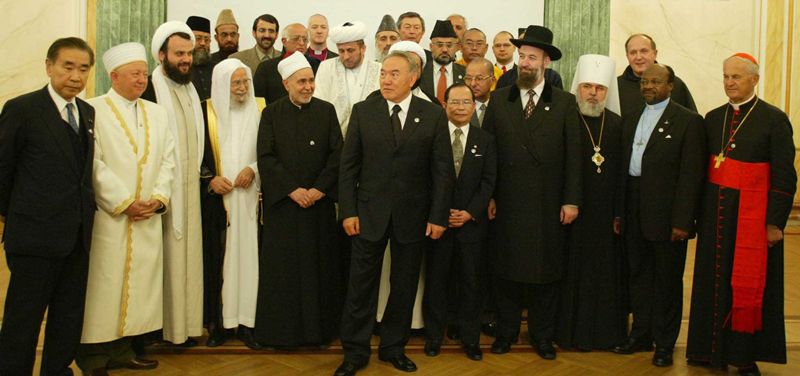 Kazakhstan has used a variety of means to promote itself as a model of economic development and social progress, such as chairing the OSCE in 2010, hosting Expo 2017 and bidding for the 2022 Winter Olympics. Another, less high-profile but important means of image crafting is connected with religion.
Kazakhstan has used a variety of means to promote itself as a model of economic development and social progress, such as chairing the OSCE in 2010, hosting Expo 2017 and bidding for the 2022 Winter Olympics. Another, less high-profile but important means of image crafting is connected with religion.
Aiming to reinforce the idea that Kazakhstan is a place where a wide variety of ethnic groups live in harmony, Kazakhstan has hosted the Congress of Leaders of World and Traditional Religions. Initiated in 2003 by Kazakhstani President Nursultan Nazarbayev, the congress has convened in the Kazakhstani capital Astana every three years since its founding.
Eighty delegates from 42 countries attended the fifth congress, held in June of this year. Senior representatives of international organizations – including the United Nations, Organization of Islamic Cooperation, UNESCO, World Islamic League, Alliance of Civilizations and OSCE – also participated. Like its past iterations, the June event brought together leaders from mainstream Muslim, Jewish, Christian, and Buddhist communities to discuss hot topics, in this particular case the central themes were how to counter the spread of radicalism, and to foster tolerance.
There was a noteworthy discrepancy involving the gathering’s composition: there were leaders of religious groups with large global representations but an extremely small presence in Kazakhstan (including Buddhism, Taoism and Hinduism), while many movements that have a significant presence in the country were deliberately excluded from this event due to being classified as “non-traditional.”
The use of the adjectives “universal” and “traditional” in the title of the congress is not accidental and barely conceals the widening gap between official discourse concerning tolerance and openness and the country’s inconsistent application of religious rights in the domestic context. The respect for religious diversity that Kazakhstan promotes universally appears to be under strain at home. Kazakhstani legislation guarantees equal treatment of all religions, but at the same time acknowledges the historical role of Hanafi Islam and the Russian Orthodox Church. Both are regarded as so-called traditional religions that have been present on Kazakh territory for many centuries. At the same time, authorities seem unwelcoming of “new” religious movements that have gained followers in Kazakhstan in recent years.
From this perspective, Kazakhstan promotes freedom for what it considers traditional religions, namely the majority religion (Islam), the main minority religion (Russian Orthodoxy), and some other Christian confessions, such as Roman Catholicism and Lutheranism. But other evangelical Christian believers, such as Baptists, Seventh Day Adventists and Jehovah’s Witnesses, are increasingly challenged. Most of these groups have had a presence in Central Asia since the 19th century, when these areas were incorporated into the Russian Empire. Many of them are now under growing pressure due to administrative and criminal sanctions. In addition, the government has created so-called anti-sect centers, even though the term “sect” has never been clearly defined, and thus lumps all types of movements into one category, including those that embrace violence.
A new law on religion adopted in 2011 prohibited the activities of any unregistered movement and led to the closure of many religious organizations, police raids, detentions, and fines. The law’s onerous and complex registration requirements have led to a sharp drop in the number of registered religious groups, both Muslim and Christian, in Kazakhstan. Some religious communities are subject to police and secret police surveillance. Criminal charges of extremism regularly are brought against a range of individuals for engaging in ostensibly peaceful religious activity. The country is now one of only 33 nations that the United States Commission on International Religious Freedom monitors for “serious religious freedom violations.”
Ultimately, there is a glaring religious contradiction in Kazakhstan. The government, utilizing the Congress and other means, promotes itself as a bastion of tolerance to the outside world. But reality seems very different to a wide variety of believers inside the country.
Editor's note: Sebastien Peyrouse is a research professor at George Washington University in Washington, DC. He is affiliated with the Central Asia Program at the Elliott School of International Affairs.
EurasiaNet, 12.12.2015




